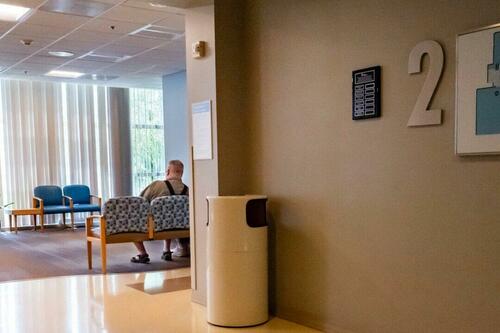Authored by Jack Phillips via The Epoch Times (emphasis ours),
Researchers found that adult heart attack survivors who took specific vitamin D doses reduced their risk of developing another heart attack by more than half, compared with people who did not take the vitamin D dose.

Research done by Utah-based Intermountain Health found that there was a 52 percent lower risk of suffering another heart attack in people who already survived one and who received “personalized dosing of vitamin D supplements” to reach vitamin D levels of 40 nanograms per milliliter for around four years, said a news release from the American Heart Association (AHA).
That was compared to those who did not receive management of their vitamin D levels, the AHA said.
Over 85 percent of the people who enrolled in the study had vitamin D levels below that threshold, while nearly 52 percent in the study group had to take more than 5,000 international units (IU) of vitamin D per day to reach the blood target levels, the Nov. 9 release said. The 5,000 IU dose is around six times the 800 IU that is recommended by the Food and Drug Administration (FDA) per day.
* * *
Yes, we sell Vitamin D which we'd be grateful if you'd try - though whether or not you buy from us, please absorb the information in this article.
* * *
“Previous clinical trial research on vitamin D tested the potential impact of the same vitamin D dose for all participants without checking their blood levels first,” Heidi T. May of Intermountain Health said in an AHA statement.
The researchers also checked the study participants’ vitamin D levels when they started the study, followed up, adjusting the dose as needed to reach a range of between 40 and 80 nanograms per milliliter, the statement said.
The authors of the paper suggested that their findings could allow health care providers to focus more on blood testing for people who had experienced heart attacks and to provide tailored doses for them.
While the AHA did not say what form of vitamin D was administered in the study, a separate news release issued by Intermountain Health said that the researchers used vitamin D3, the most common form used in dietary supplements.
In the statement, May said the researchers “observed no adverse outcomes when giving patients higher doses of vitamin D3 supplementation, and to significantly reduce the risk of another heart attack, which are exciting results.”
The study was presented at the American Heart Association Scientific Sessions 2025 in New Orleans earlier this month. It enrolled 630 adults with acute coronary syndrome who were treated at the Intermountain Medical Center in Salt Lake City from April 2017 to May 2023 and who had an average follow-up of 4.2 years for their condition.
The AHA said that around 107 major cardiac events, such as a heart attack, stroke, heart failure that required hospitalization, or death, occurred in the study period.
The paper released this month adds to a growing body of research around vitamin D supplementation and heart disease. Last year, a study found that taking vitamin D supplements doesn’t reduce the risk of cardiac arrest in older adults, while one published in the British Medical Journal showed there was an association between the supplements and major cardiac events among people over the age of 60.
Aside from supplements, foods that are considered rich in vitamin D include egg yolks, fatty fish, fish liver oil, and cheese, while some foods like cereal, orange juice, milk, and others are fortified with the vitamin. Vitamin D is also activated in the body when the skin is exposed to sunlight.
May added that her organization is encouraging those who have heart disease to speak to health care providers about targeted vitamin D dosing.
Loading recommendations...